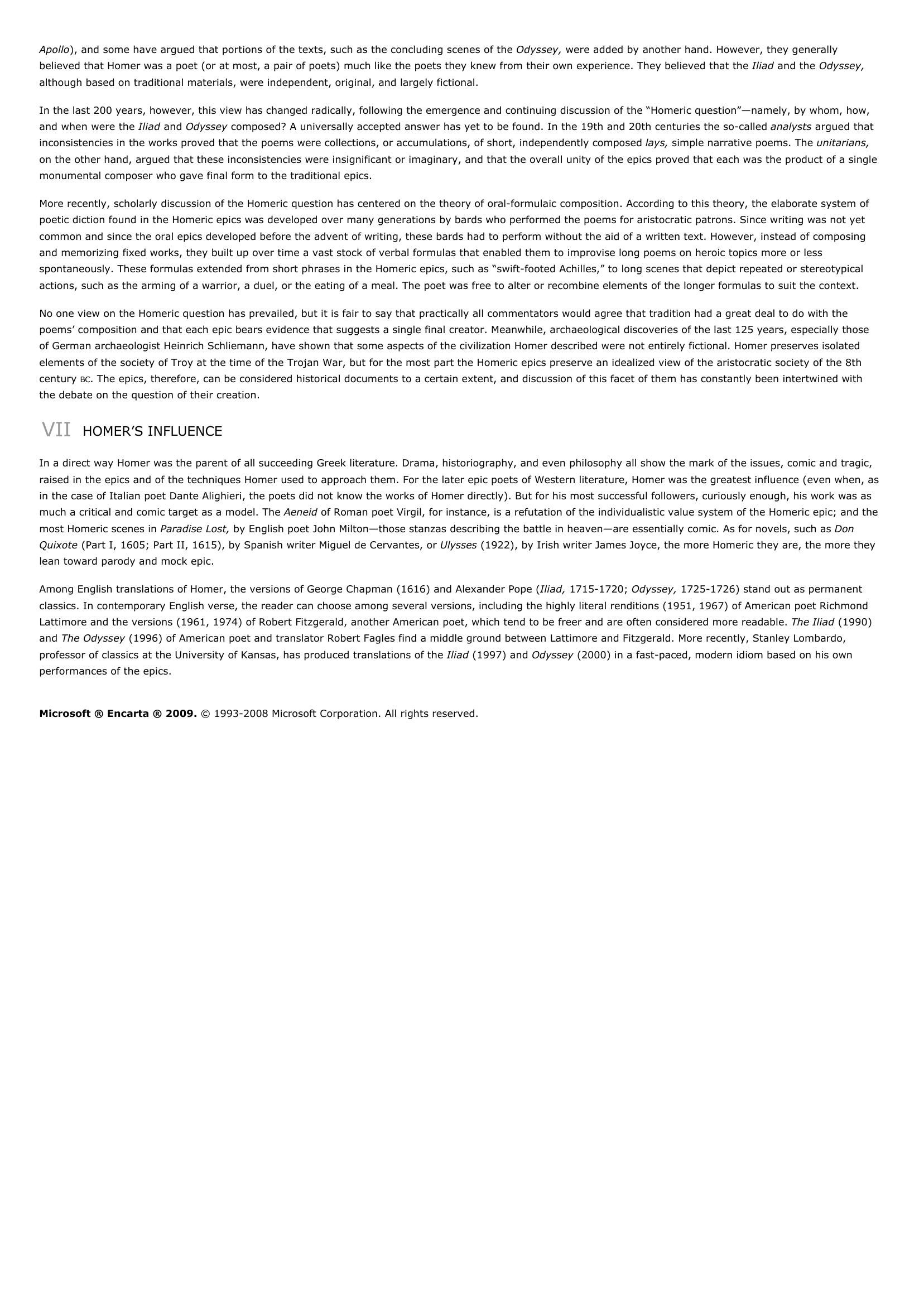Homer I INTRODUCTION Homer, the name traditionally assigned to the author of the Iliad and the Odyssey, the two major epics that have survived from Greek antiquity.
Publié le 10/05/2013

Extrait du document
«
Apollo ), and some have argued that portions of the texts, such as the concluding scenes of the Odyssey, were added by another hand.
However, they generally believed that Homer was a poet (or at most, a pair of poets) much like the poets they knew from their own experience.
They believed that the Iliad and the Odyssey, although based on traditional materials, were independent, original, and largely fictional.
In the last 200 years, however, this view has changed radically, following the emergence and continuing discussion of the “Homeric question”—namely, by whom, how,and when were the Iliad and Odyssey composed? A universally accepted answer has yet to be found.
In the 19th and 20th centuries the so-called analysts argued that inconsistencies in the works proved that the poems were collections, or accumulations, of short, independently composed lays, simple narrative poems.
The unitarians, on the other hand, argued that these inconsistencies were insignificant or imaginary, and that the overall unity of the epics proved that each was the product of a singlemonumental composer who gave final form to the traditional epics.
More recently, scholarly discussion of the Homeric question has centered on the theory of oral-formulaic composition.
According to this theory, the elaborate system ofpoetic diction found in the Homeric epics was developed over many generations by bards who performed the poems for aristocratic patrons.
Since writing was not yetcommon and since the oral epics developed before the advent of writing, these bards had to perform without the aid of a written text.
However, instead of composingand memorizing fixed works, they built up over time a vast stock of verbal formulas that enabled them to improvise long poems on heroic topics more or lessspontaneously.
These formulas extended from short phrases in the Homeric epics, such as “swift-footed Achilles,” to long scenes that depict repeated or stereotypicalactions, such as the arming of a warrior, a duel, or the eating of a meal.
The poet was free to alter or recombine elements of the longer formulas to suit the context.
No one view on the Homeric question has prevailed, but it is fair to say that practically all commentators would agree that tradition had a great deal to do with thepoems’ composition and that each epic bears evidence that suggests a single final creator.
Meanwhile, archaeological discoveries of the last 125 years, especially thoseof German archaeologist Heinrich Schliemann, have shown that some aspects of the civilization Homer described were not entirely fictional.
Homer preserves isolatedelements of the society of Troy at the time of the Trojan War, but for the most part the Homeric epics preserve an idealized view of the aristocratic society of the 8thcentury BC.
The epics, therefore, can be considered historical documents to a certain extent, and discussion of this facet of them has constantly been intertwined with the debate on the question of their creation.
VII HOMER’S INFLUENCE
In a direct way Homer was the parent of all succeeding Greek literature.
Drama, historiography, and even philosophy all show the mark of the issues, comic and tragic,raised in the epics and of the techniques Homer used to approach them.
For the later epic poets of Western literature, Homer was the greatest influence (even when, asin the case of Italian poet Dante Alighieri, the poets did not know the works of Homer directly).
But for his most successful followers, curiously enough, his work was asmuch a critical and comic target as a model.
The Aeneid of Roman poet Virgil, for instance, is a refutation of the individualistic value system of the Homeric epic; and the most Homeric scenes in Paradise Lost, by English poet John Milton—those stanzas describing the battle in heaven—are essentially comic.
As for novels, such as Don Quixote (Part I, 1605; Part II, 1615), by Spanish writer Miguel de Cervantes, or Ulysses (1922), by Irish writer James Joyce, the more Homeric they are, the more they lean toward parody and mock epic.
Among English translations of Homer, the versions of George Chapman (1616) and Alexander Pope ( Iliad, 1715-1720; Odyssey, 1725-1726) stand out as permanent classics.
In contemporary English verse, the reader can choose among several versions, including the highly literal renditions (1951, 1967) of American poet RichmondLattimore and the versions (1961, 1974) of Robert Fitzgerald, another American poet, which tend to be freer and are often considered more readable.
The Iliad (1990) and The Odyssey (1996) of American poet and translator Robert Fagles find a middle ground between Lattimore and Fitzgerald.
More recently, Stanley Lombardo, professor of classics at the University of Kansas, has produced translations of the Iliad (1997) and Odyssey (2000) in a fast-paced, modern idiom based on his own performances of the epics.
Microsoft ® Encarta ® 2009. © 1993-2008 Microsoft Corporation.
All rights reserved..
»
↓↓↓ APERÇU DU DOCUMENT ↓↓↓
Liens utiles
- Homer I INTRODUCTION Homer According to tradition, the Greek poet Homer is believed to be the author of the Iliad and the Odyssey, two great epics of ancient Greek literature.
- Latinus Roman A legendary, perhaps historical, king of the Latini or Latins, an original people of central Italy, and the hero from whom that people got their name.
- Odyssey Greek The epic poem by Homer that describes the adventures of Odysseus on his homeward voyage to Ithaca after the Trojan War.
- Palladium Greek The sacred statue of Pallas Athene that was said to have fallen from heaven.
- Wolfgang Amadeus Mozart I INTRODUCTION Wolfgang Amadeus Mozart Wolfgang Amadeus Mozart, an 18th-century Austrian classical composer and one of the most famous musicians of all time, came from a family of musicians that included his father and sister.







